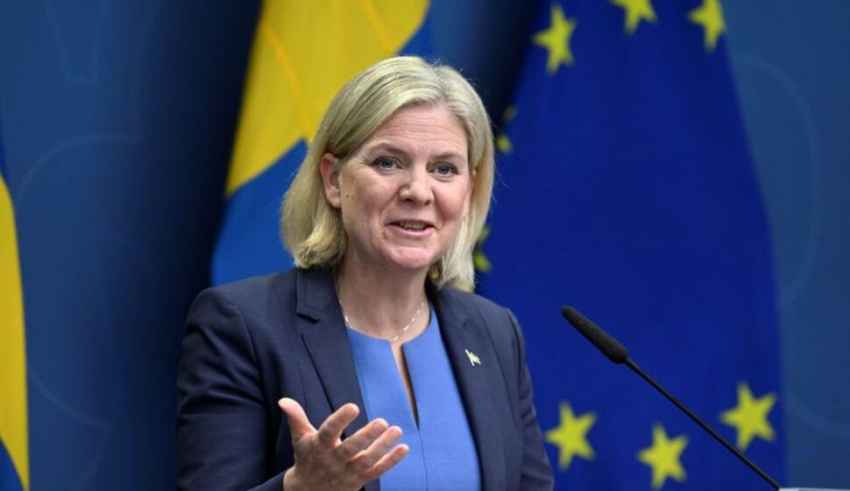
Sweden saw itself as an open country, a humanitarian world power. Now that the right-wing populists gained influence on the government for the first time, the new prime minister bears a great responsibility.
The Swedish prime minister has initiated the change of power with her withdrawal. That’s how it’s been done for a long time, and that’s how it’s always happened smoothly for decades. But Magdalena Andersson’s words when she announced her resignation made it clear that something special was happening. The Social Democrat spoke of many Swedes being worried. She told future Prime Minister Ulf Kristersson and his civil society partners that they had a great responsibility : They would have to draw a line against all attempts to spread hatred, threats and violence. Her words made it clear that Sweden was experiencing a historic transition of power. For the first time, right-wing populists will gain considerable influence on the Swedish government.
The Sweden Democrats emerged as the second strongest force at the election on Sunday 11th of September. The center-right has only them to thank for this victory. Kristersson is unlikely to include them in his government, but he is likely to depend on their votes. For a long time, this seemed unthinkable in Stockholm.
Not so unusual in Northern Europe
But if you broaden your perspective, it’s not that unusual : whether in Oslo, Helsinki or Copenhagen, populist forces have already been directly or indirectly involved in government everywhere in the north. The parties are different, each of them have their own particularities, and yet they are similar. In a sense, Stockholm is following the path of Nordic normalization. Also probably because the right lessons have not been learned from the experiences of its neighbors.
This does not make it easier for Sweden. For a long time, it believed it was an exception. Because the country has written a great history of upswing, a history of prosperity, welfare and peace. Sweden saw itself as a country of enlightenment and emancipation, as an open country that welcomed everyone, as a humanitarian world power. But now a party will influence the government that says : Sweden first.
The Sweden Democrats have gained percent points in every election since they first entered the Riksdag (Swedens parliament) in 2010. This is also a failure of the other parties. For a long time, they had tried to avoid the Sweden Democrats, as well as their issues.
Parallel societies and increasing crime
Even before 2010, Sweden had been changing. The welfare state had come under pressure because of high costs, this made space for a liberalization movement and even some frustration among the voters. In addition, something was happening in the suburbs of the cities, where many people lived who were new to Sweden. It became increasingly difficult to integrate everyone. Parallel societies formed, crime increased and Sweden was exposed to gang crimes, which was new for the Scandinavian country.
But the parties found it difficult to talk about it. Until the Sweden Democrats came along and made a simple calculation : “We secure the welfare state if we stop immigration”. They promoted their image of Sweden; it was no longer colorful. It was crude, the undertone xenophobic. Not to mention the party’s roots in racist movements and extremist outbursts by some members. But it was effective because for a long time they were almost the only ones to address problems that many Swedes had long since observed in their cities.
After the refugee crisis in 2015, asylum policy became somewhat stricter, and after the 2018 election, Kristersson’s moderates his speeches and the Christian Democrats finally abandoned the isolation of the Sweden Democrats. The realization that there was no path to power for the Christian Democrats without the votes of right-wing populists probably played a role. They sharpened their rhetoric, and the fight against the many shootings in the country brought them together. During the election campaign, even the Social Democrats suddenly started talking much harder about integration problems and segregation. But the social democrats woke up to late, this could no longer prevent the success of the Sweden Democrats.
Now Kristersson actually bears a great responsibility. He must lead a government that identifies problems with integration and crime and tries to solve them without appealing to xenophobic reflexes.
In Copenhagen, the Danish People’s Party supported a government after 2001 and was influential for a long time. The country has since pursued a strict immigration and asylum policy. But the tone of the debate has also sharpened. While the People’s Party is losing ground, even the Danish Social Democrats have adopted an almost ruthless toughness on integration and asylum policy. Kristersson can now prove that Sweden is an exception after all. Perhaps he will succeed in finding a more humane, more Swedish way.
https://www.euronews.com/2015/06/19/scandinavian-right-wing-politics-winning-more-and-more-votes
https://www.bbc.com/news/world-europe-62908902
https://www.statista.com/statistics/1178223/number-of-shootings-in-sweden/
https://www.diva-portal.org/smash/get/diva2:710302/FULLTEXT01.pdf
By The European Institute for International Law and International Relations.














